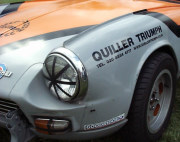Ethanol-Added Fuel
Petrol used to be readily available as unleaded or leaded. Leaded is hard to find now in Europe - if your vehicle still requires leaded fuel to run right then see here
In the 1980s the lead additive in petrol was phased out to be replaced by Methyl-Tert-Butyl (MTBE) as being more environmentally friendly than lead. In the 1990s MTBE fell out of favour, to be replaced by Ethanol, initially at 5%, but recently that percentage has gone up to 10% and is may increase further in the future. Although Ethanol works well as an octane booster it tends to be corrosive to some types of rubber, as well as being hydroscopic. Older vehicles may have just about been able to cope with 5% ethanol, but the jump to 10% (E10 fuel) has proved problematic.
Older formulations of rubber hose, carb rubber diaphrams, and associated rubber fuel line components as well as filters have tended to go soft and even melt. When replacing these components make sure that they are new stock which will stand up to Ethanol, rather than old stock which tend not to.
A further problem with ethanol is that it absorbs water - this can cause issues with vehicles that are stored for a period, eg over winter, as water can tend to accumulate at the bottom of the fuel tank causing it to rust internally, leading to the requirement to re-seal petrol tanks against ethanol fuels, as here. Water may also accumulate in fuel lines and the bottom of carb float bowls.
E10 fuel is already with us in the UK, France introduced it last year as a pump option, but advises owners of vehicles manufactured before 2000 not to use it. Germany has so far put off the introduction of ethanol-added fuels. |














